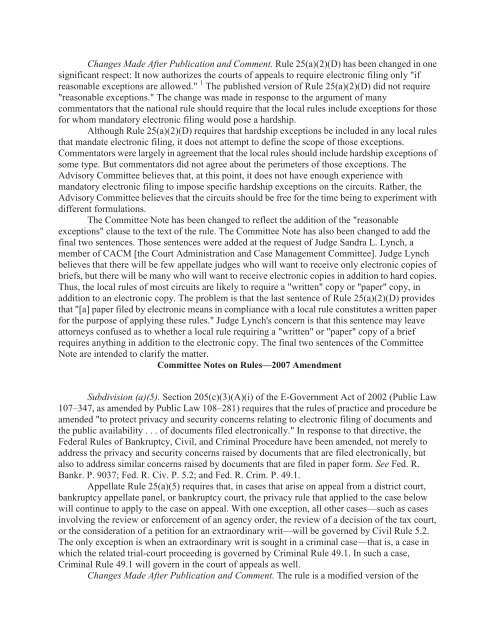Federal Rules of Appellate Procedure 2014-2015, 2014a
Federal Rules of Appellate Procedure 2014-2015, 2014a
Federal Rules of Appellate Procedure 2014-2015, 2014a
Create successful ePaper yourself
Turn your PDF publications into a flip-book with our unique Google optimized e-Paper software.
Changes Made After Publication and Comment. Rule 25(a)(2)(D) has been changed in one<br />
significant respect: It now authorizes the courts <strong>of</strong> appeals to require electronic filing only "if<br />
reasonable exceptions are allowed." 1 The published version <strong>of</strong> Rule 25(a)(2)(D) did not require<br />
"reasonable exceptions." The change was made in response to the argument <strong>of</strong> many<br />
commentators that the national rule should require that the local rules include exceptions for those<br />
for whom mandatory electronic filing would pose a hardship.<br />
Although Rule 25(a)(2)(D) requires that hardship exceptions be included in any local rules<br />
that mandate electronic filing, it does not attempt to define the scope <strong>of</strong> those exceptions.<br />
Commentators were largely in agreement that the local rules should include hardship exceptions <strong>of</strong><br />
some type. But commentators did not agree about the perimeters <strong>of</strong> those exceptions. The<br />
Advisory Committee believes that, at this point, it does not have enough experience with<br />
mandatory electronic filing to impose specific hardship exceptions on the circuits. Rather, the<br />
Advisory Committee believes that the circuits should be free for the time being to experiment with<br />
different formulations.<br />
The Committee Note has been changed to reflect the addition <strong>of</strong> the "reasonable<br />
exceptions" clause to the text <strong>of</strong> the rule. The Committee Note has also been changed to add the<br />
final two sentences. Those sentences were added at the request <strong>of</strong> Judge Sandra L. Lynch, a<br />
member <strong>of</strong> CACM [the Court Administration and Case Management Committee]. Judge Lynch<br />
believes that there will be few appellate judges who will want to receive only electronic copies <strong>of</strong><br />
briefs, but there will be many who will want to receive electronic copies in addition to hard copies.<br />
Thus, the local rules <strong>of</strong> most circuits are likely to require a "written" copy or "paper" copy, in<br />
addition to an electronic copy. The problem is that the last sentence <strong>of</strong> Rule 25(a)(2)(D) provides<br />
that "[a] paper filed by electronic means in compliance with a local rule constitutes a written paper<br />
for the purpose <strong>of</strong> applying these rules." Judge Lynch's concern is that this sentence may leave<br />
attorneys confused as to whether a local rule requiring a "written" or "paper" copy <strong>of</strong> a brief<br />
requires anything in addition to the electronic copy. The final two sentences <strong>of</strong> the Committee<br />
Note are intended to clarify the matter.<br />
Committee Notes on <strong>Rules</strong>—2007 Amendment<br />
Subdivision (a)(5). Section 205(c)(3)(A)(i) <strong>of</strong> the E-Government Act <strong>of</strong> 2002 (Public Law<br />
107–347, as amended by Public Law 108–281) requires that the rules <strong>of</strong> practice and procedure be<br />
amended "to protect privacy and security concerns relating to electronic filing <strong>of</strong> documents and<br />
the public availability . . . <strong>of</strong> documents filed electronically." In response to that directive, the<br />
<strong>Federal</strong> <strong>Rules</strong> <strong>of</strong> Bankruptcy, Civil, and Criminal <strong>Procedure</strong> have been amended, not merely to<br />
address the privacy and security concerns raised by documents that are filed electronically, but<br />
also to address similar concerns raised by documents that are filed in paper form. See Fed. R.<br />
Bankr. P. 9037; Fed. R. Civ. P. 5.2; and Fed. R. Crim. P. 49.1.<br />
<strong>Appellate</strong> Rule 25(a)(5) requires that, in cases that arise on appeal from a district court,<br />
bankruptcy appellate panel, or bankruptcy court, the privacy rule that applied to the case below<br />
will continue to apply to the case on appeal. With one exception, all other cases—such as cases<br />
involving the review or enforcement <strong>of</strong> an agency order, the review <strong>of</strong> a decision <strong>of</strong> the tax court,<br />
or the consideration <strong>of</strong> a petition for an extraordinary writ—will be governed by Civil Rule 5.2.<br />
The only exception is when an extraordinary writ is sought in a criminal case—that is, a case in<br />
which the related trial-court proceeding is governed by Criminal Rule 49.1. In such a case,<br />
Criminal Rule 49.1 will govern in the court <strong>of</strong> appeals as well.<br />
Changes Made After Publication and Comment. The rule is a modified version <strong>of</strong> the


















